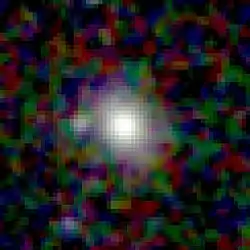| NGC 700 | |
|---|---|
 2MASS image of NGC 700. | |
| Observation data (J2000 epoch) | |
| Constellation | Andromeda |
| Right ascension | 01h 52m 16.8s[1] |
| Declination | 36° 02′ 12″[1] |
| Redshift | 0.015264[1] |
| Heliocentric radial velocity | 4576 km/s[1] |
| Distance | 200 Mly (60 Mpc)[1] |
| Group or cluster | Abell 262 |
| Apparent magnitude (V) | 15.16[1] |
| Characteristics | |
| Type | S0?[1] |
| Size | ~55,000 ly (17 kpc) (estimated)[1] |
| Apparent size (V) | 0.9 x 0.7[1] |
| Other designations | |
| CGCG 522-30, PGC 6928[1] | |
NGC 700 is a lenticular galaxy located 200 million light-years away[2] in the constellation Andromeda. NGC 700 was discovered by astronomer Bindon Stoney on October 28, 1850.[3] It is also a member of Abell 262.[4][5]
The galaxy PGC 6924 is often misidentified as NGC 700.[3]
See also
References
- 1 2 3 4 5 6 7 8 9 10 "NASA/IPAC Extragalactic Database". Results for NGC 700. Retrieved 2018-11-21.
- ↑ "Your NED Search Results". ned.ipac.caltech.edu. Retrieved 2018-11-21.
- 1 2 "New General Catalog Objects: NGC 700 - 749". cseligman.com. Retrieved 2018-11-21.
- ↑ "Detailed Object Classifications". ned.ipac.caltech.edu. Retrieved 2018-11-21.
- ↑ M., Garcia, A. (July 1993). "General study of group membership. II - Determination of nearby groups". Astronomy and Astrophysics Supplement Series. 100: 47. Bibcode:1993A&AS..100...47G. ISSN 0365-0138.
{{cite journal}}: CS1 maint: multiple names: authors list (link)
External links
 Media related to NGC 700 at Wikimedia Commons
Media related to NGC 700 at Wikimedia Commons- NGC 700 on WikiSky: DSS2, SDSS, GALEX, IRAS, Hydrogen α, X-Ray, Astrophoto, Sky Map, Articles and images
This article is issued from Wikipedia. The text is licensed under Creative Commons - Attribution - Sharealike. Additional terms may apply for the media files.